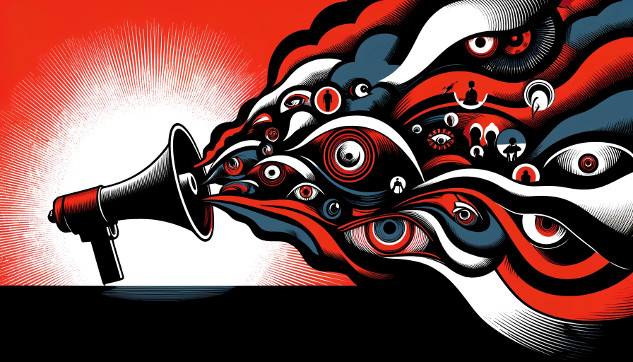
Very few names carry as much infamy and intrigue as Joseph Goebbels. As the mastermind behind Nazi Germany's massive propaganda machine, Goebbels was a master at manipulating media and waging psychological warfare. His chilling legacy is more than just a grim lesson from history books. It provides crucial insights into how polarization and brainwashing tactics can threaten democracy itself - especially in our current era of deep division and widespread mistrust.
The Rise of an Evil Propagandist
Joseph Goebbels was born in 1897 in the German town of Rheydt. Raised in a working-class family, he harbored literary ambitions. Still, he grew disillusioned with the struggling Weimar Republic after World War I. This led him down a dark path towards the radical Nazi party.
In 1933, the Nazis seized power, and Adolf Hitler himself appointed Goebbels as the regime's Minister of Propaganda. This granted Goebbels unprecedented control over every form of media and communication in Germany.
Goebbels' Genius for Deception
As a propaganda maestro, Goebbels craftily exploited new media technology and psychological tactics. His arsenal included manipulating information via newspapers, radio, and film to serve the Nazis' murderous agenda. He spread lies to demonize opponents and distractors.
But facts and truth were just one part of his sinister toolbox. Goebbels was a master at emotional manipulation, too. He orchestrated over-the-top spectacles and rallies purely designed to whip the masses into a brainwashed, cult-like frenzy worshipping Hitler. By appealing to primal instincts like fear and nationalist pride, he made Germans blindly obedient to the Nazi evil.
The Horrifying Aftermath
The consequences of Goebbels' relentless propaganda campaign were beyond catastrophic. Through unremitting indoctrination across all forms of media, Germans were molded into blindly obedient supporters of the Nazi regime. Dissent was effectively quashed as the populace was brainwashed into embracing the party's hateful ideology. Even the slightest objection or criticism could result in severe punishment, creating an atmosphere of fear and coerced conformity.
Most disturbingly, Goebbels played a pivotal role in dehumanizing Jews and other marginalized groups, depicting them as "subhuman vermin" and existential threats to the so-called Aryan race. This systematic dehumanization paved the way for the unthinkable horrors of the Holocaust genocide. By stripping away the humanity of these targeted populations, Goebbels' propaganda machine made the unimaginable mass murder of millions seem not only justifiable but necessary in the twisted Nazi worldview. His despicable lies and manipulation of truth laid the psychological groundwork for one of the darkest chapters in human history, enabling atrocities on an unprecedented scale.
Eerie Parallels Today
While the brutality of Nazi Germany seems a world away, we'd be foolish to think Goebbels-style tactics can't rear their ugly head again. In our era dominated by social media and 24/7 cable news, the manipulation of information is more potent than ever before.
Some modern-day political players are already weaponizing misinformation and fake news to spark confusion and intensify societal divisions. From baseless QAnon conspiracy theories gone viral to coordinated disinformation blitzes by enemy nations, the digital landscape has given new life to old-school propaganda gambits.
Furthermore, the rise of partisan echo chambers and filter bubbles has made polarization in America even worse. Just like Goebbels exploited tribalism to turn people against one another, some divisive actors today are actively promoting an "us vs them" climate. They demonize opponents not as fellow citizens but as traitorous enemies to be defeated.
Chilling Echoes of the Past
Some of the parallels are jarringly specific. Today's white supremacist hate groups, for instance, aren't so different from the Nazi party's own paramilitary Brown Shirt enforcers who used intimidation and violence against minority groups.
Both then and now, these extremists peddle a dangerous mix of nationalist zealotry and racial hatred. They stoke irrational fears about racial minorities and immigrants to advance their twisted, hateful agendas that threaten democratic values.
There are also eerie similarities between the Christian nationalist movement in 1930s Germany that infused religion with Nazi ideology...and certain fundamentalist factions in America today working to legislate their version of Christian-based governance and policies. This same toxic fusion of church and partisan state was a powerful tool for Hitler's regime, too.
A Dire Warning for Democracy
Joseph Goebbels' legacy is a haunting reminder that the consequences of rampant propaganda and authoritarianism can be apocalyptic for modern civilization. But his refined tactics still hold a dangerous allure, especially during economic insecurity, social upheaval, or national crisis.
To safeguard our democracy, we must prioritize media literacy and critical thinking from an early age. Citizens need sharp skills to identify misinformation and resist manipulation. We also must remain vigilant in calling out leaders who undermine democratic norms or freedom of the press.
Ultimately, the lessons from Nazi Germany's descent into darkness serve as a wake-up call about the fragility of truth and justice when unchecked propaganda takes hold. By studying Goebbels' nefarious playbook and recognizing its modern imitators, we can strive to create a more informed society that places human rights and dignity above dangerous lies and demagoguery.
After all, as the philosopher George Santayana famously warned: "Those who cannot remember the past are condemned to repeat it." The fate of our very democracy may depend on ensuring we never forget how evil propaganda like Goebbels almost destroyed the civilized world.
About the Author
 Robert Jennings is co-publisher of InnerSelf.com with his wife Marie T Russell. He attended the University of Florida, Southern Technical Institute, and the University of Central Florida with studies in real estate, urban development, finance, architectural engineering, and elementary education. He was a member of the US Marine Corps and The US Army having commanded a field artillery battery in Germany. He worked in real estate finance, construction and development for 25 years before starting InnerSelf.com in 1996.
Robert Jennings is co-publisher of InnerSelf.com with his wife Marie T Russell. He attended the University of Florida, Southern Technical Institute, and the University of Central Florida with studies in real estate, urban development, finance, architectural engineering, and elementary education. He was a member of the US Marine Corps and The US Army having commanded a field artillery battery in Germany. He worked in real estate finance, construction and development for 25 years before starting InnerSelf.com in 1996.
InnerSelf is dedicated to sharing information that allows people to make educated and insightful choices in their personal life, for the good of the commons, and for the well-being of the planet. InnerSelf Magazine is in its 30+year of publication in either print (1984-1995) or online as InnerSelf.com. Please support our work.
Creative Commons 4.0
This article is licensed under a Creative Commons Attribution-Share Alike 4.0 License. Attribute the author Robert Jennings, InnerSelf.com. Link back to the article This article originally appeared on InnerSelf.com

Related Books:
On Tyranny: Twenty Lessons from the Twentieth Century
by Timothy Snyder
This book offers lessons from history for preserving and defending democracy, including the importance of institutions, the role of individual citizens, and the dangers of authoritarianism.
Click for more info or to order
Our Time Is Now: Power, Purpose, and the Fight for a Fair America
by Stacey Abrams
The author, a politician and activist, shares her vision for a more inclusive and just democracy and offers practical strategies for political engagement and voter mobilization.
Click for more info or to order
How Democracies Die
by Steven Levitsky and Daniel Ziblatt
This book examines the warning signs and causes of democratic breakdown, drawing on case studies from around the world to offer insights into how to safeguard democracy.
Click for more info or to order
The People, No: A Brief History of Anti-Populism
by Thomas Frank
The author offers a history of populist movements in the United States and critiques the "anti-populist" ideology that he argues has stifled democratic reform and progress.
Click for more info or to order
Democracy in One Book or Less: How It Works, Why It Doesn't, and Why Fixing It Is Easier Than You Think
by David Litt
This book offers an overview of democracy, including its strengths and weaknesses, and proposes reforms to make the system more responsive and accountable.

























